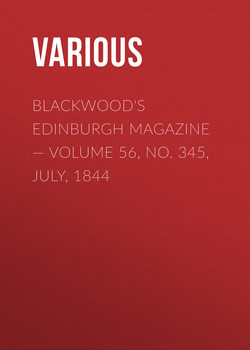Читать книгу Blackwood's Edinburgh Magazine — Volume 56, No. 345, July, 1844 - Various - Страница 6
MEMORANDUMS OF A MONTH'S TOUR IN SICILY JOURNEY TO SEGESTE
ОглавлениеLeaving Palermo early, we pass Monreale in our way to the Doric columns of Segeste, and find ourselves, before the heat of day has reached its greatest intensity, at a considerable elevation above the plain on which the capital stands, amidst mountains which, except in the difference of their vegetation, remind us not a little of the configuration of certain wild parts of the Highlands, where Ben Croachin flings his dark shadow across Loch Awe. Indeed, we were thinking of this old and favourite fishing haunt with much complacency, when two men suddenly came forth from behind the bristly aloes and the impenetrable cactus—ill-looking fellows were they; but, moved by the kindest intentions for our safety, they offer to conduct us through the remainder of the defile. This service our hired attendant from Palermo declined, and we push on unmolested to Partenico, our halting-place during the heat of the day. It is a town of some extent, large enough to afford two fountains of a certain pretension, but execrably dirty within. Twelve thousand inhabitants has Partenico, and five churches. Out of its five locandas, who shall declare the worst? Of that in which we had first taken refuge, (as, in a snow-storm on the Alps, any roof is Paradise,) we were obliged to quit the shelter, and walk at noon, at midsummer, and in Sicily, a good mile up a main street, which, beginning in habitations of the dimensions of our almshouses, ends in a few huts intolerably revolting, about which troops of naked children defy vermin, and encrust themselves in filth. At one door we could not help observing that worst form of scabies, the gale à grosses bulles; so we had got, it appeared, from Scylla into Charybdis, and were in the very preserves of Sicilian itch, and we prognosticate it will spread before the month expires wherever human skin is to be found for its entertainment. Partenico lies in a scorching plain full of malaria. Having passed the three stifling hours of the day here, we proceed on our journey to Alcamo, a town of considerable size, which looks remarkably well from the plain at the distance of four miles—an impression immediately removed on passing its high rampart gate. Glad to escape the miseries with which it threatens the détenu, we pass out at the other end, and zigzag down a hill of great beauty, and commanding such views of sea and land as it would be quite absurd to write about. Already a double row of aloë, planted at intervals, marks what is to be your course afar off, and is a faithful guide till it lands you in a Sicilian plain. This is the highest epithet with which any plain can be qualified. This is indeed the month for Sicily. The goddess of flowers now wears a morning dress of the newest spring fashion; beautifully made up is that dress, nor has she worn it long enough for it to be sullied ever so little, or to require the washing of a shower. A delicate pink and a rich red are the colours which prevail in the tasteful pattern of her voluminous drapery; and as she advances on you with a light and noiseless step, over a carpet which all the looms of Paris or of Persia could not imitate, scattering bouquets of colours the most happily contrasted, and impregnating the air with the most grateful fragrance, we at once acknowledge her beautiful impersonation in that "monument of Grecian art," the Farnese Flora, of which we have brought the fresh recollection from the museum of Naples.
The Erba Bianca is a plant like southernwood, presenting a curious hoar-frosted appearance as its leaves are stirred by the wind. The Rozzolo a vento is an ambitious plant, which grows beyond its strength, snaps short upon its overburdened stalk, and is borne away by any zephyr, however light. Large crops of oats are already cut; and oxen of the Barbary breed, brown and coal-black, are already dragging the simple aboriginal plough over the land. Some of these fine cattle (to whom we are strangers, as they are to us) stood gazing at us in the plain, their white horns glancing in the sun; others, recumbent and ruminating, exhibit antlers which, as we have said before, surpass the Umbrian cattle in their elk-like length and imposing majesty. Arrived at the bottom of our long hill, we pass a beautiful stream called Fiume freddo, whose source we track across the plain by banks crowned with Cactus and Tamarisk. Looking back with regret towards Alcamo, we see trains of mules, which still transact the internal commerce of the country, with large packsaddles on their backs; and when a halt takes place, these animals during their drivers' dinner obtain their own ready-found meal, and browse away on three courses of vegetables and a dessert.
